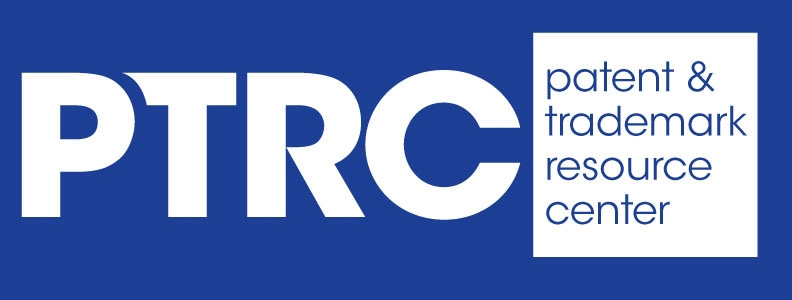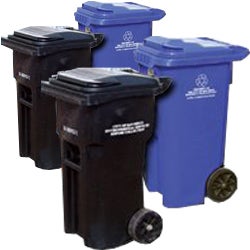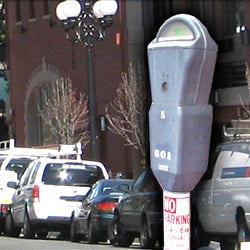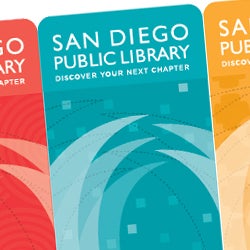Patent & Trademark Resource Center

About the Center
The San Diego Public Library (SDPL) is an officially designated Patent and Trademark Resource Center (PTRC) that is part of a nationwide library network maintained by the U.S. Patent and Trademark Office (USPTO).
The Patent and Trademark Resource Center is located on the 3rd floor of the Central Library. You do not need to visit SDPL in-person to access search tools, but the library provides certain resources (e.g. a current collection of full-color Plant patents, and legal reference books) that are only accessible in-person.
Contact Us
PTRC Representatives are library staff who are information experts trained on how to use search tools to access patent and trademark information. Representatives can:
- Demonstrate how to use search tools to conduct a patent or trademark search
- Direct you to information and explain the application process and fee schedule
For in-depth assistance, please contact Sarah Hendy-Jackson at shendyjackso@sandiego.gov or request an appointment below:
Special Events from the U.S. Patent and Trademark Office
April 26, 2024—12 noon – 1 p.m. PST – VIRTUAL
Federal Trademark Searching --- Overview
This webinar will introduce you to the fundamental mechanics of using our trademark search system. It’s geared toward new users and those interested in conducting basic searches. We’ll cover:
-
Why you should search
-
Basic search strategy
-
Common searches
-
Finding help
April 30, 2024—11 a.m. – 12:30 p.m. PST – VIRTUAL
Trademark Basics Boot Camp, Module 5: Application filing walk-through
Are you a small business owner or entrepreneur interested in learning about trademarks and how to apply for a federal registration? If so, this event is a must-attend. In this fifth module of our eight-part virtual Trademark Basics Boot Camp, we’ll focus on the USPTO’s Trademark Electronic Application System (TEAS), including a live demonstration of a trademark filing. TEAS is the required system for making any trademark submission to the USPTO. The event is free, but space is limited, so register early.
This module will cover the following topics:
-
Trademark basics
-
TEAS basics
-
TEAS pre-filing checklist
-
TEAS Plus demonstration
-
Finding help
May 9, 2024—11 a.m. – 12:30 p.m. PST – VIRTUAL
The Path to a Patent, Part V: Understanding the role of claims in a patent application
Are you an inventor preparing to file a patent application? In part five of this eight-part recurring series, our experts will discuss the parts of the claim, show examples of claim illustrations from issued U.S. patents, and help participants develop a better appreciation of how a patent examiner views a claim.
To get the most out of this workshop, you should have an intermediate knowledge of the intellectual property (IP) system and of patents specifically. We recommend that you complete the previous sessions in the series, Part I: IP basics and Part IV: Learn how to draft your patent application, before attending.
May 16, 2024—11 a.m. – 12:30 p.m. PST – VIRTUAL
The Path to a Patent, part VI: Learn how to Protect your IP Abroad
Did you know that patents offer territorial rights, meaning that there is no such thing as an international or global patent? Learn how to help protect your intellectual property (IP) in foreign jurisdictions.
In part six of this eight-part recurring series, International Patent Legal Administration experts will discuss considerations and options for filing foreign patent applications. The discussion will include an overview of the Patent Cooperation Treaty (PCT) and the use of the Paris Convention for non-PCT countries.
What is a patent?
How to Get Started
- 7 Step US Patent Search Strategy Guide
- How to Conduct a Preliminary U.S. Patent Search: a Step by Step Strategy (Tutorial Video)
Useful Websites
- United States Patent & Trademark Office - Learn about the patent application process. Search for patents and published patent applications. File your own patent application.
- USPTO Webinars - Free live webinars offered by the USPTO's Silicon Valley Regional Office.
- Conociendo sobre la Propiedad Intelectual - En el presente site podrá encontrar información relevante sobre todos los aspectos de la propiedad intelectual. Para mayor información u orientación, favor visitar o hacer cita en el Centro de Recursos de Patentes y Marcas de la Biblioteca General del Recinto Univresitario de Mayagüez de la Universidad de Puerto Rico.
- European Patent Office - The official website of the European Patent Office (EPO). Find information on applying and searching for patents, legal issues on patents, patent grants, rules and regulations about European and international patent applications.
- WIPO - World Intellectual Property Organization - WIPO is responsible for the promotion of the protection of intellectual property throughout the world through co-operation among States and for the administration of various multilateral treaties dealing with the legal and administrative aspects of intellectual property.
- Japan Patent Office - Learn about intellectual property in Japan.
U.S. Patent Search Tools
- Patent Public Search - Patent Public Search was created in 2022 to replace the Pub EAST and Pub WEST systems with a single, more robust online platform that provides the public access to search tools used by patent examiners.
- PAIR - Patent Application Information Retrieval - Get information about a patent application's status.
- Patent Assignment Search - Search for Patent Assignment information beginning August 1980.
- Official Gazette for Patents - The Official Gazette for Patents allows you to see patents issued each week and is available online for the past year. You can browse by classification or type of patent.
International Patent Search Tools
- Espacenet (EPO) - Search the European Patent Office database.
- Patentscope (WIPO) - Search for international patent documents.
- Industrial Property Digital Library (JPO) - Search Patent Abstracts of Japan.
- Korea Intellectual Property Rights Information Service - Search Korea's patent database.
What Is a Trademark or Servicemark?
How to Get Started
Videos about Trademarks
- Introduction to the USPTO and Trademark Basics
- Before You File
- Searching
- Applicant Information
- Drawing Issues
Useful Websites
- USPTO Trademarks - Start here for information about United States trademark searching and registration.
- California Trademarks - The State of California maintains its own trademark and service mark registry.
- International Trademark Association - Learn about trademark protection around the world.
- OHIM - Office for the Harmonization of the Internal Market (Trade Marks and Designs): The European Union agency responsible for registering trademarks and designs that are valid in all 27 countries of the EU.
- Madrid System for the International Registration of Marks - Learn about how to protect your mark in foreign countries.
Trademark Search Tools
- Trademark Electronic Search System (TESS) - Search for registered trademarks and service marks in the United States.
- Design Search Code Manual - Find the codes needed to search for specific kinds of images in TESS.
- Trademark Status & Document Retrieval (TSDR) - Use this database to obtain information about pending and registered trademarks.
- Official Gazette for Trademarks - The Official Gazette for Trademarks is issued each week. In addition to providing information about new marks, the Gazette lists cancelled and renewed registrations.
Trademark Symbols
A trademark can be claimed with the letters TM written in superscript: TM
A service mark can be claimed with the letters SM written in superscript: SM
A trademark or service mark that has been registered with the USPTO is signified by the letter R with a circle around it: ®
What is Copyright?
Useful Websites
- United States Copyright Office - The home page of the U.S. Copyright Office. Learn about copyright; search for registrations; download forms; register your work online.
- Copyright Refresher - An overview of copyright from the USPTO.
- World Intellectual Property Organization - Copyright and Related Rights - Learn about copyright in an international context.
Copyright Search Tools
- Copyright Catalog (1978 to present) - Search records of registered books, music, art, and periodicals, and other works. Includes copyright ownership documents.
For registrations prior to 1978, please contact the Central Library.
Copyright Symbols
Small Business Resources
Legal Resources
Business Names























